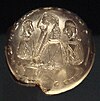Aphthonius of Alexandria
Aphthonius (Ancient Greek: Ἀφθόνιος) of Alexandria is mentioned by church historian Philostorgius[1] as a learned and eloquent bishop of the Manichaeans. He is mentioned as a disciple and commentator of the prophet Mani by Photios I of Constantinople and Peter of Sicily, and in the form of abjuring Manichaeism.
Philostorgius adds that the Arian theologian Aëtius of Antioch challenged Aphthonius to a public debate, and traveled to Alexandria to engage in this.[2] Aphthonius was defeated in the debate. Philostorgius goes on to say that Aetius won the argument so profoundly, and caused his opponent such shame, that Aphthonius fell ill immediately afterward, and died of grief seven days later.[3]
Notes
[edit]- ^ Philostorgius, 3.15
- ^ Lieu, Samuel N. C. (1992). Manichaeism in the Later Roman Empire and Medieval China. Wissenschaftliche Untersuchungen zum Neuen Testament. Vol. 63. Mohr Siebeck. p. 138. ISBN 9783161458200. Retrieved 2016-02-21.
- ^ Philostorgius (2007). "Philostorgius: Church History". Writings from the Greco-Roman World (23). Translated by Amidon, Philip R. Society of Biblical Literature: 54. ISBN 9781589832152. ISSN 1569-3600. Retrieved 2016-02-01.
![]() This article incorporates text from a publication now in the public domain: Smith, Philip (1870). "Aphthonius". In Smith, William (ed.). Dictionary of Greek and Roman Biography and Mythology. Vol. 1. p. 225.
This article incorporates text from a publication now in the public domain: Smith, Philip (1870). "Aphthonius". In Smith, William (ed.). Dictionary of Greek and Roman Biography and Mythology. Vol. 1. p. 225.

